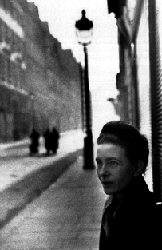Feminist Simone de Beauvoir, the influential french intellectual and author will have her 100th birthday this week.
| Simone de Beauvoir is best known for The Second Sex, her scandalous 1949 account of what it meant to be female – regarded as the founding text for the modern women’s movement. She met Jean-Paul Sartre in Paris in 1929 when both were sitting a highly competitive postgraduate qualification in philosophy. He came first and she came second. They rejected marriage and never lived together, but within their open relationship, they agreed that their lovers would be secondary and their love for each other “absolute”. Practising existentialism and individual freedom in her public and private life, De Beauvoir was an award-winning novelist, |
 image link |
| philosopher and celebrated memoirist who later championed political causes such as Algerian independence. She said her relationship with Sartre was her greatest achievement in life. She died in 1986. | |
According to the above quoted article from the Guardian France is already preparing a hype and publishing frenzy around De Beauvoir’s centenary sorrily obviously with a primary focus on her sexual life. Despite the importance of her attempts and experiments to live a self-defined life also in this regards it should not overshadow her intellectual achievements – especially for women – being feminist or not.
The ambiguity her writings and person still can cause might be best displayed by the intro to her entry into the Stanford Encyclopedia of Philosophy:
Some have found Beauvoir’s exclusion from the domain of philosophy more than a matter of taking Beauvoir at her word. They attribute it to a narrow view of philosophy which, rejecting the method of the metaphysical novel, ignored the philosophical issues raised, explored and argued in Beauvoir’s literary works. Between those who did not challenge Beauvoir’s self portrait, those who did not accept her understanding of philosophy and thereby ignored the philosophical implications of her fiction, and those who missed the unique signature of her philosophical essays, Beauvoir the philosopher remained a lady in waiting.
Some have argued that the belated admission of Beauvoir into the ranks of philosophers is a matter of sexism on two counts. The first concerns the fact that Beauvoir was a woman. Her philosophical writings were read as echoes of Sartre rather than explored for their own contributions because it was only “natural” to think of a woman as a disciple of her male companion. The second concerns the fact that she wrote about women. The Second Sex, recognized as one of the hundred most important works of the twentieth century, would not be counted as philosophy because it dealt with sex, hardly a burning philosophical issue (so it was said). …
.. ok I think this seems already enough of argumenting to show her importance .. so please continue reading at the links offered on her wikipedia entry or at The Internet Encyclopedia of Philosophy or go straight to the Marxists Internet Archive, a site which also offers some of de Beauvoir’s texts as electronic sources:
The Second Sex (e-text)
.. see also their archive-link for further texts.
